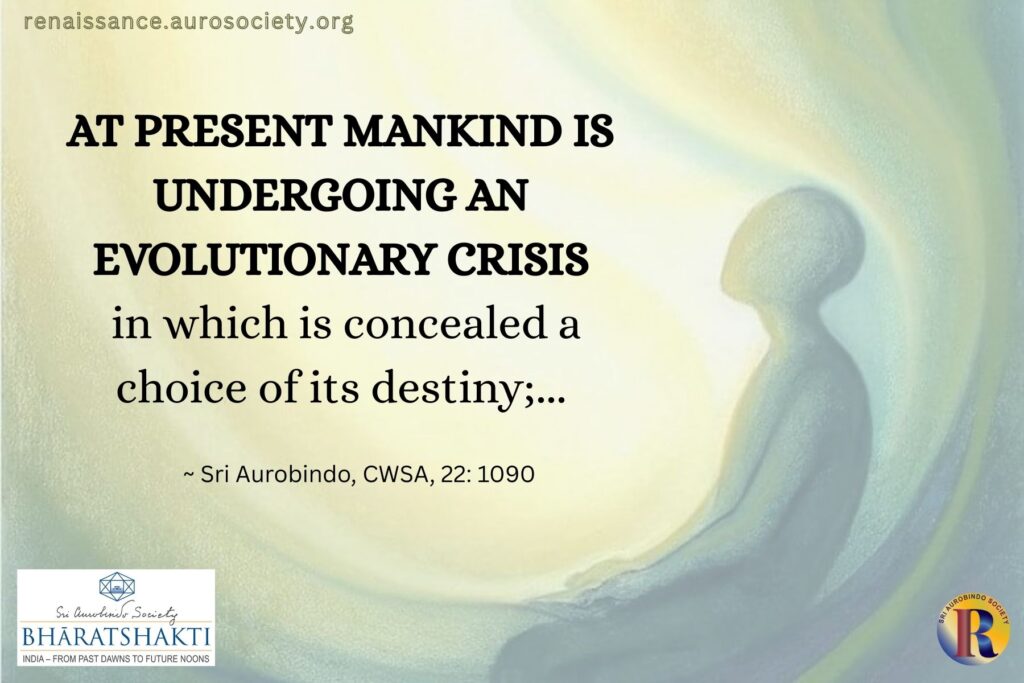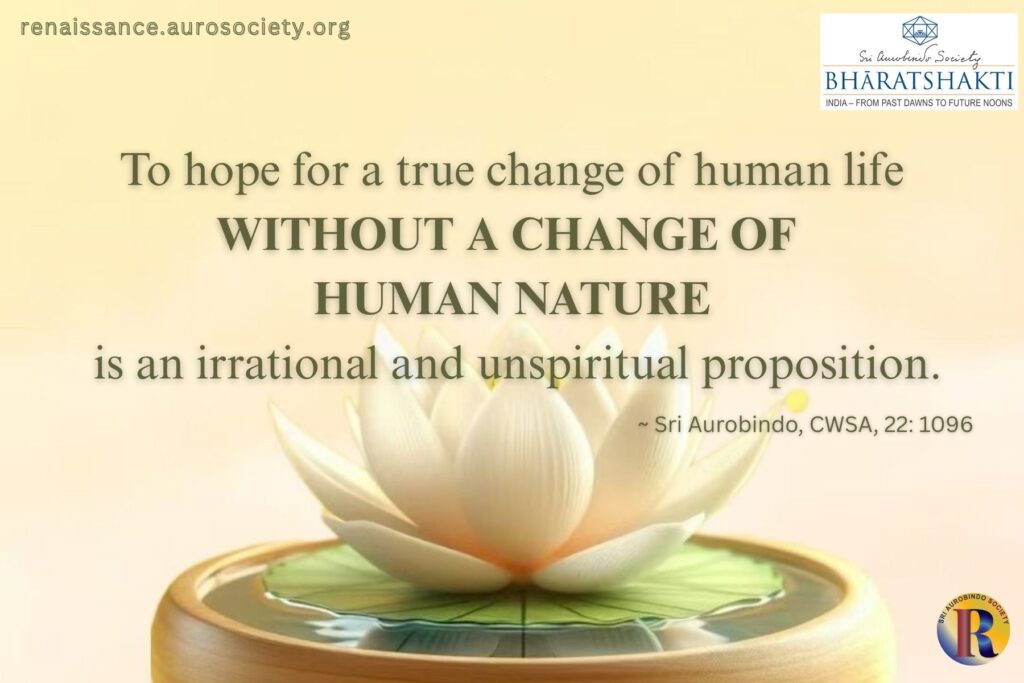Volume III, Issue 4
Author: Sri Aurobindo and the Mother
Editor’s note: We feature here a few passages from various volumes of Sri Aurobindo and the Mother. These words remind us that winning victories over the weaknesses in our nature and constantly aspiring for truth, harmony and universal goodwill are the best ways to help others and do good for the world. Some explanation by the Mother on the difference between spirituality and morality helps us gain the right framework to understand the quality of ‘goodness.’

Of Goodness and Beauty
The divine Good is no doubt necessarily beautiful, because on a higher plane good and beauty and all else that is divine in origin meet, coalesce, harmonise. But what men call good is often ugly or drab or unattractive. Human beauty is not always the picture of the good, it is sometimes the mask of evil—the reality behind that mask is not always goodness.
~ Sri Aurobindo, CWSA, Vol. 27, p. 703
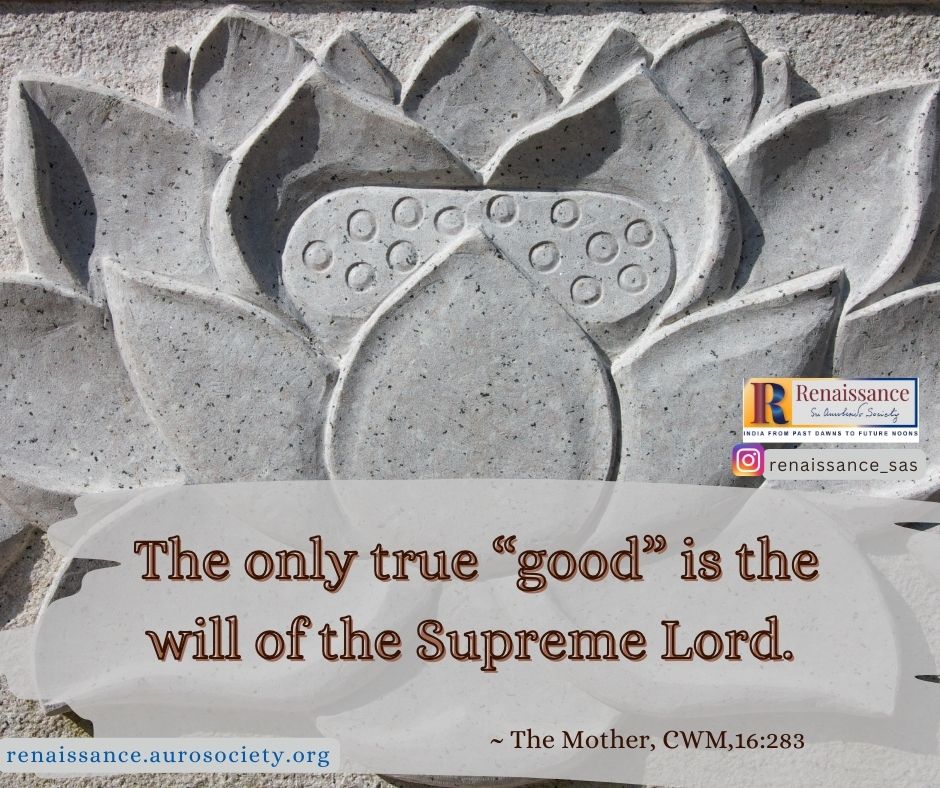
Win your small victories
Disciple: Can one help the world with a vibration of goodwill?
With good wishes one can change many things, only it must be an extremely pure and unmixed goodwill. It is quite obvious that a thought, a perfectly pure and true prayer, if it is sent forth into the world, does its work.
But where is this perfectly pure and true thought when it passes into the human brain? There are degradations. If through an effort of inner consciousness and knowledge, you can truly overcome in yourself a desire, that is to say, dissolve and abolish it, and if through inner goodwill, through consciousness, light, knowledge, you are able to dissolve the desire, you will be, first of all in yourself personally, a hundred times happier than if you had satisfied this desire, and then it will have a marvellous effect.
It will have a repercussion in the world of which you have no idea. It will spread forth. For the vibrations you have created will continue to spread. These things grow larger like the snowball. The victory you win in your character, however small it be, is one which can be gained in the whole world.
. . . all things which are done outwardly without changing the inner nature—hospitals, schools, etc.—are done through vanity, for the feeling of being great, whilst these small unnoticed things overcome in oneself gain an infinitely greater victory, though the effects are hidden. Every movement in you which is false and opposed to the truth is a negation of the divine life. Your small efforts have considerable results which you don’t even have the satisfaction of knowing, but which are true and have precisely an impersonal and general effect.
If you really want to do something good, the best thing you can do is to win your small victories in all sincerity, one after another, and thus you will do for the world the maximum you are able to.
* * *
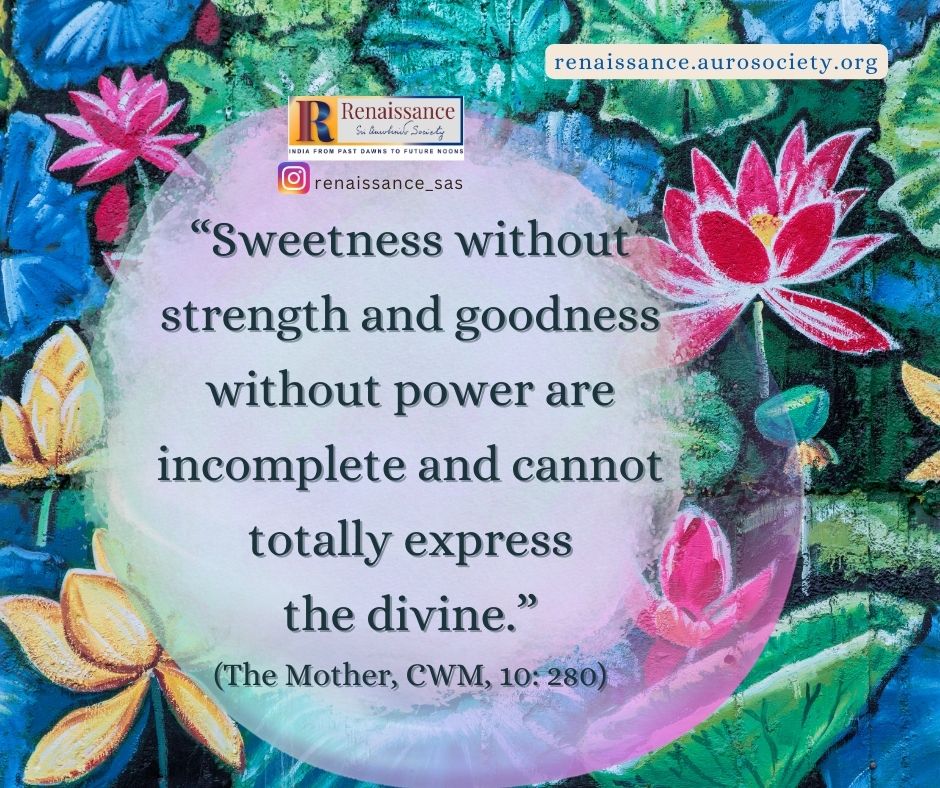
Disciple: Will our victory act for the whole world?
It will not change the whole world. For your victory is too small for the whole world. Millions of such victories are needed. It is a very small victory if compared with the whole. But it gets mingled with other things. . . It could be said that it is like bringing into the world the capacity of doing a thing.
But for this to act effectively, at times centuries are necessary; it is a question of proportion. You can try it out (and it is much more difficult) even with those around you. You must be absolutely sincere, not do it with the idea of getting a result, but because you want to gain a victory.
If you gain it, it will necessarily have an effect on those around you. But if a bargaining element is mixed up in it, if you do this thing because you want to get that other: “I want to overcome my defects, but that person must also overcome his”, then that doesn’t work. It is a merchant’s attitude: “I give this, but I shall take that.” That spoils everything. There is neither sincerity nor purity. It is bargaining.
Nothing must be mixed with your sincerity, your aspiration, your motive. You do things for love of the Divine, for truth, for perfection, without any other motive, any other idea. And that brings results.
~ The Mother, CWM, Vol. 5, pp. 19-20

Also read:
From the Dhammapada: The Mother on Goodness, Happiness and Vigilance

* * *
Aspire for a goodwill which never fails
If for five minutes in the day you happen to remember that there is something in the universe like the supramental Force, and that, after all, “it would be nice if it manifested in me”, and then all the rest of the time you are thinking of something else and are busy with other things, there is not much chance that it would come and do any serious work in you.
Sri Aurobindo says this quite clearly and precisely. He does not tell you that you will do it, he says it is the Divine Will. So don’t come and say, “Ah! I can’t.” No one is asking you to do it. But there must be enough aspiration and adhesion in the being to make the expansion of the being, the expansion of consciousness possible.
For, to tell the truth, everybody is small, small, small, so small that there is not enough room to put any supramental in! It is so small that it is already quite filled up with all the ordinary little human movements. There must be a great widening to make room for the movements of the Supermind.
And then there must also be an aspiration for progress: not to be satisfied with what one is, how one is, what one does, what one knows or thinks one knows; but to have a constant aspiration for something more, something better, for a greater light, a vaster consciousness, a truer truth and a more universal goodness. And over and above all this, a goodwill which never fails.
~ The Mother, CWM, Vol. 8, pp. 204-205


Helping others
To concentrate most on one’s own spiritual growth and experience is the first necessity of the sadhak—to be too eager to help others draws away from the inner work. There is also likely to be an overzeal and haste which clouds the discrimination and makes what help is given less effective than it should be. To grow in the spirit is the greatest help one can give to others, for then something flows out naturally to those around that helps them.
***
As for helping [others], you can only be sure of that if you yourself have an assured basis, with the psychic being always prominent, full of faith and joy and strength,—then others can gather strength and faith and joy from such a one by speech or contact. But to arrive at that you must, as I have been telling you, open yourself to the Light and Force that come from myself and the Mother and to no other influence.
***
This “helping others” is a perilous business—it brings the “guru” ego or else you very uncertainly rid others of their difficulties and very certainly get them yourself. “Why do you have all these disciples?” said a sage to some Maratha saint (I have forgotten the names); “to have disciples means to add all their difficulties to your own.” “Helping others” has the same disadvantage.
~ Sri Aurobindo, CWSA, Vol. 31, pp. 317-318

To help others is the best way of helping oneself. For, if you are sincere, you will soon discover that all their difficulties and all their failures are the sure signs of the same corresponding deficiency in you. Indeed, they prove that something in you is not perfect enough to be all-powerful.
***
Each of those who are around us can be for us, provided we are attentive, a mirror in which one or more aspects of our being are reflected. If we know how to profit by it, it is a powerful help for our progress. And when the mirror is sincere and of goodwill, the value of the help becomes considerable.
***
The best way of helping others is to transform oneself. Be perfect and you will be in a position to bring perfection to the world.
~ The Mother, CWM, Vol. 14, pp. 275-276
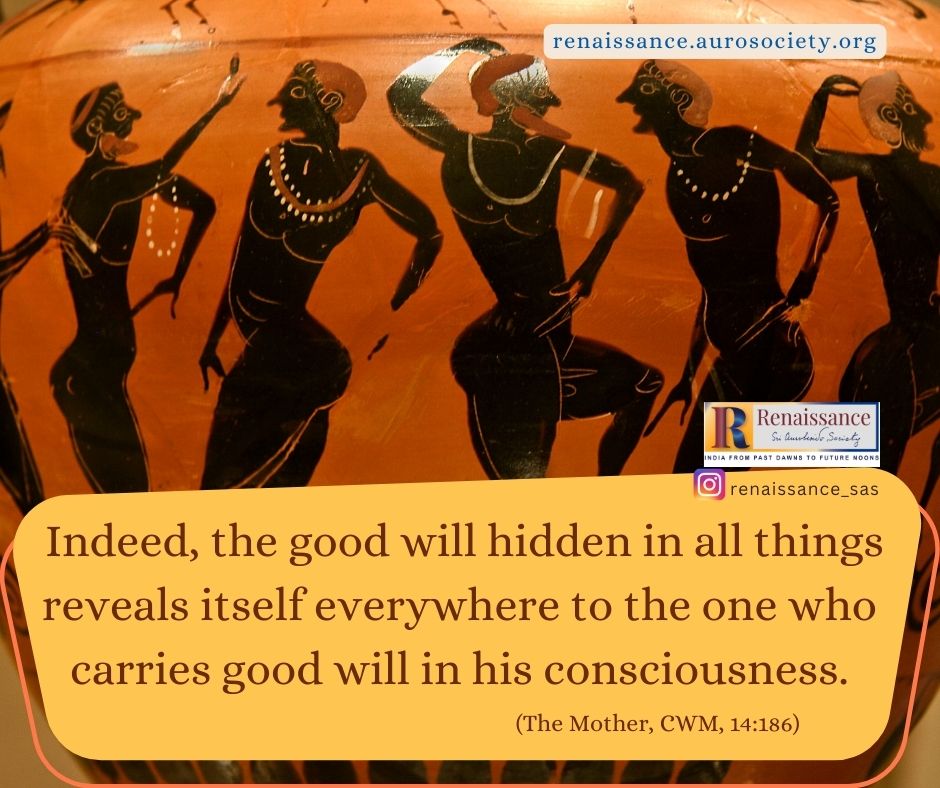
The world will be made better only in proportion as we make ourselves better. The Vedantic truth that the world is only a projection—a function—of our consciousness is as pragmatically true as it is spiritually true.
The ills that humanity suffers from—collectively and individually—stem from the errors that lie at the roots of our ignorant nature. We must be cleansed of these evils—individually first of all—if we ever hope to see a clean world outside. A yoga of self-purification is the condition precedent to a yoga of perfection.
But, in the end, a Higher Destiny leans over earth’s children and its ways are beyond calculation.
***
So long as you do not have the power to change the world, it is useless to say that the world is wrong. And if you abolish in yourself the things that are wrong in the world, you will see that the world will no longer be wrong.
~ The Mother, CWM, Vol. 14, pp. 277-278

The great difference between spirituality and morality
The spiritual life, the life of Yoga, has for its object to grow into the divine consciousness and for its result to purify, intensify, glorify and perfect what is in you. It makes you a power for manifesting of the Divine; it raises the character of each personality to its full value and brings it to its maximum expression; for this is part of the Divine plan.
Morality proceeds by a mental construction and, with a few ideas of what is good and what is not, sets up an ideal type into which all must force themselves. This moral ideal differs in its constituents and its ensemble at different times and different places. And yet it proclaims itself as a unique type, a categoric absolute; it admits of none other outside itself; it does not even admit a variation within itself.
All are to be moulded according to its single ideal pattern, everybody is to be made uniformly and faultlessly the same. It is because morality is of this rigid unreal nature that it is in its principle and its working the contrary of the spiritual life.
The spiritual life reveals the one essence in all, but reveals too its infinite diversity; it works for diversity in oneness and for perfection in that diversity. Morality lifts up one artificial standard contrary to the variety of life and the freedom of the spirit. Creating something mental, fixed and limited, it asks all to conform to it. All must labour to acquire the same qualities and the same ideal nature.
Morality is not divine or of the Divine; it is of man and human.
Morality takes for its basic element a fixed division into the good and the bad; but this is an arbitrary notion. It takes things that are relative and tries to impose them as absolutes; for this good and this bad differ in differing climates and times, epochs and countries. The moral notion goes so far as to say that there are good desires and bad desires and calls on you to accept the one and reject the other.
But the spiritual life demands that you should reject desire altogether. Its law is that you must cast aside all movements that draw you away from the Divine. You must reject them, not because they are bad in themselves,—for they may be good for another man or in another sphere,—but because they belong to the impulses or forces that, being unillumined and ignorant, stand in the way of your approach to the Divine.
All desires, whether good or bad, come within this description; for desire itself arises from an unillumined vital being and its ignorance. On the other hand you must accept all movements that bring you into contact with the Divine. But you accept them, not because they are good in themselves, but because they bring you to the Divine.
Accept then all that takes you to the Divine. Reject all that takes you away from it, but do not say that this is good and that is bad or try to impose your outlook on others; for, what you term bad may be the very thing that is good for your neighbour who is not trying to realise the Divine Life.
~ The Mother, CWM, Vol. 3, pp. 117-119
Also read:
Sri Aurobindo on Morality and Yoga
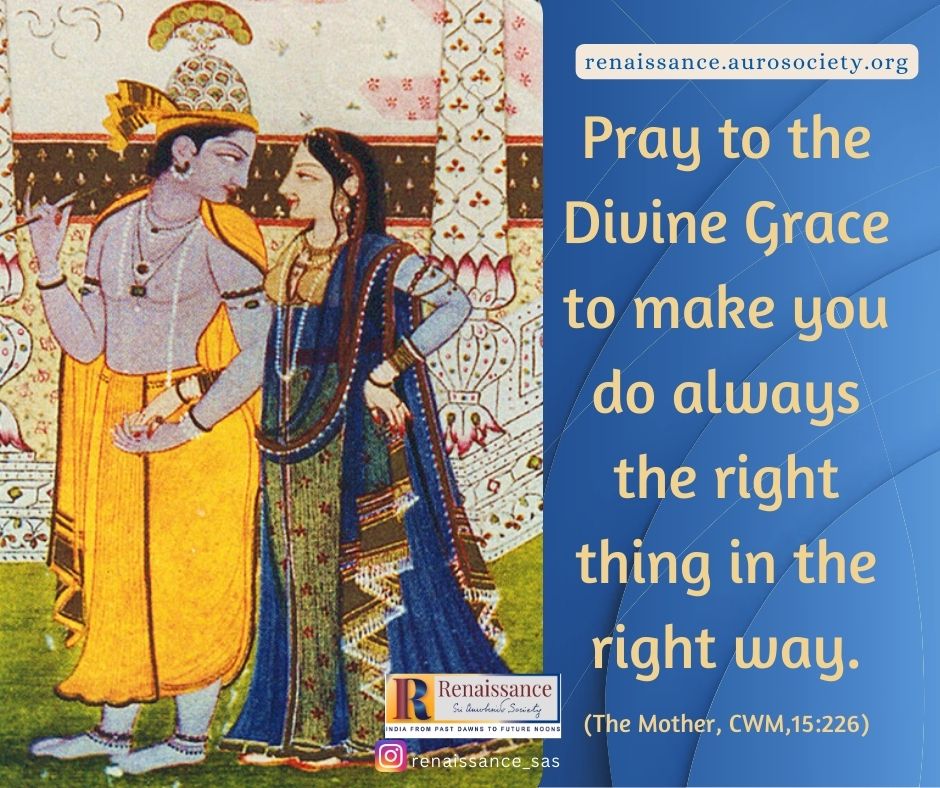

Does morality help us to increase our consciousness?
That depends on people. There are people who are helped by it, there are people who are not helped at all.
Morality is something altogether artificial and arbitrary, and in most cases, among the best, it checks the true spiritual effort by a sort of moral satisfaction that one is on the right path and a true gentleman, that one does one’s duty, fulfils all the moral requirements of life. Then one is so self-satisfied that one no longer moves or makes any progress.
It is very difficult for a virtuous man to enter the path of God; this has been said very often, but it is altogether true, for he is most self-satisfied, he thinks he has realised what he ought to have realised, he no longer has either the aspiration or even that elementary humility which makes one want to progress.
You see, one who is known here as a sattwic man is usually very comfortably settled in his own virtue and never thinks of coming out of it. So, that puts you a million leagues away from the divine realisation.
What really helps, until one has found the inner light, is to make for oneself a certain number of rules which naturally should not be too rigid and fixed, but yet should be precise enough to prevent one from going completely out of the right path or making irreparable mistakes―mistakes the consequences of which one suffers all one’s life.
* * *
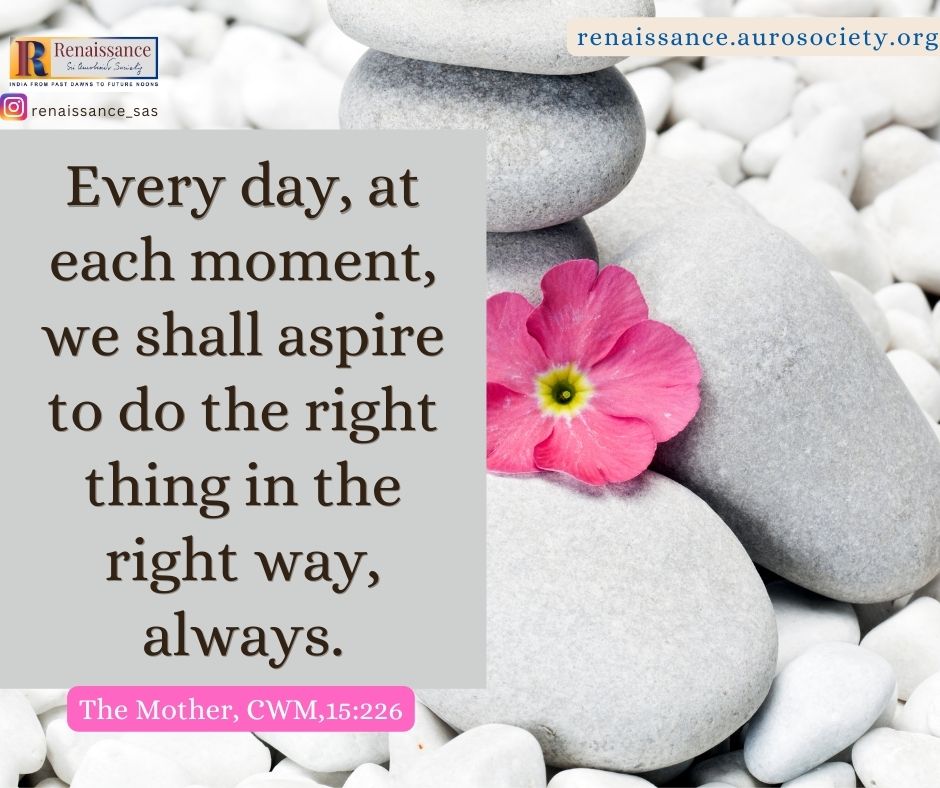
To do that, it is good to set up a certain number of principles in oneself, which, however, should be for each one, in conformity with his own nature. If you adopt a social, collective rule, you immediately make yourself a slave to this social rule, and that prevents you almost radically from making any effort for transformation.
~ The Mother, CWM, Vol. 8, p. 142

~ Design: Biswajita Mohapatra


